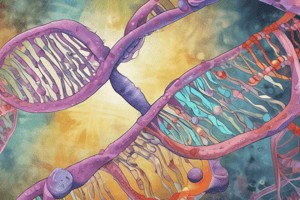Podcast
Questions and Answers
What is the typical number of chromosomes in a human cell?
What is the typical number of chromosomes in a human cell?
- 44
- 46 (correct)
- 23
- 48
What is the prevalence of autosomal dominant genetic disorders?
What is the prevalence of autosomal dominant genetic disorders?
- 1.3
- 0.9
- 0.54
- 2.5 (correct)
What is the term for one of the two identical parts of a chromosome after S phase?
What is the term for one of the two identical parts of a chromosome after S phase?
- Long arm
- Chromatid (correct)
- Short arm
- Centromere
Who is credited with determining the typical number of human chromosomes as 46?
Who is credited with determining the typical number of human chromosomes as 46?
'P' arm and 'q' arm are associated with which part of a chromosome?
'P' arm and 'q' arm are associated with which part of a chromosome?
What are the prevalence rates for autosomal recessive and sex-linked genetic disorders, as mentioned in the text?
What are the prevalence rates for autosomal recessive and sex-linked genetic disorders, as mentioned in the text?
Explain the key concept of chromosomal disorders as discussed in the text.
Explain the key concept of chromosomal disorders as discussed in the text.
Who were the key individuals involved in determining the typical number of human chromosomes and when did these discoveries take place?
Who were the key individuals involved in determining the typical number of human chromosomes and when did these discoveries take place?
What are the components of the structure of a human chromosome, as described in the text?
What are the components of the structure of a human chromosome, as described in the text?
How many pairs of chromosomes are classified as 'autosomes' in humans, and how many chromosomes are typically found in a human cell?
How many pairs of chromosomes are classified as 'autosomes' in humans, and how many chromosomes are typically found in a human cell?
Flashcards are hidden until you start studying
Study Notes
Chromosome Basics
- Humans typically have 46 chromosomes in each somatic cell, organized into 23 pairs.
- Of these, 22 pairs are autosomes, while the 23rd pair consists of sex chromosomes (XX or XY).
Chromosomal Structure
- A chromosome has two identical halves called sister chromatids after the S phase of the cell cycle.
- Chromosomes are structured with a 'P' arm (short arm) and a 'q' arm (long arm).
Genetic Disorders
- Autosomal dominant disorders occur in approximately 50% of offspring when one parent carries the mutation.
- Autosomal recessive disorders have a prevalence of about 1 in 4 for affected offspring when both parents are carriers.
- Sex-linked disorders, particularly X-linked disorders, are more common in males than females due to the presence of only one X chromosome in males.
Historical Contributions
- Walter Sutton and Theodor Boveri are credited with determining the typical number of human chromosomes (46) in the early 20th century (around the 1900s).
Chromosomal Disorders
- Chromosomal disorders arise from atypical chromosomal numbers or structure, leading to conditions such as Down syndrome (trisomy 21) or Turner syndrome (monosomy X).
Summary of Key Facts
- Typical chromosome count in humans: 46
- Autosomal dominant disorder prevalence: 50% risk in offspring
- Chromosome structure: Comprises sister chromatids and distinct P and q arms
- Key historical figures: Walter Sutton and Theodor Boveri from the early 1900s
- Chromosome pairs: 22 pairs of autosomes and 1 pair of sex chromosomes
Studying That Suits You
Use AI to generate personalized quizzes and flashcards to suit your learning preferences.




